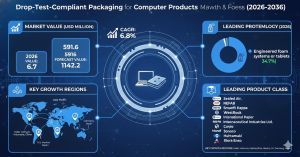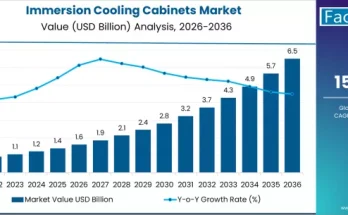The Marketing Operations Management industry encompasses the tools, processes, and strategies used by organizations to effectively manage and optimize their marketing operations. It includes a wide range of activities aimed at improving the efficiency, effectiveness, and return on investment (ROI) of marketing initiatives.
Comprehensive Overview of Marketing Operations Management Market
The Marketing Operations Management (MOM) market is driven by increasing demands for streamlined workflows, data-driven insights, and automation in marketing. As digital channels expand and customer experience becomes paramount, businesses require robust MOM platforms to centralize data, optimize resources, and ensure compliance with regulations. These factors are fueling the growth of MOM solutions, driving innovation and adoption across industries.
As per FACTMR, the marketing operations management industry is expected to witness a value of US $ 22.6 Billion in 2032. Moreover, the market is expected to witness a CAGR of 7.9% during the forecast period (2022-2032).
Key Components of Marketing Operations Management
Marketing Operations Management comprises several key components that work together to streamline and optimize marketing processes:
- Campaign Management: Campaign management involves planning, executing, tracking, and analyzing marketing campaigns across email, social media, and digital advertising to achieve desired outcomes. Planning and executing campaigns require careful consideration of target audience, messaging, budget allocation, and channel selection. Also, it helps track campaign performance metrics such as impressions, clicks, conversions, and ROI, allowing marketers to assess effectiveness and make adjustments as needed. Besides this, analysis of campaign data provides insights into what worked well and areas for improvement, informing future campaign strategies and optimizations.
- Marketing Resource Management (MRM): This manages budgets, assets, workflows, and resources efficiently to ensure optimal utilization and alignment with business goals. Effective budget management involves allocating resources strategically to maximize ROI and achieve marketing objectives within budget constraints.
- Marketing Automation: Automates repetitive marketing tasks such as email marketing, lead nurturing, and customer segmentation to improve efficiency and scalability. Email marketing automation allows for personalized and targeted communication with leads and customers, increasing engagement and conversions.
- Digital Asset Management (DAM): Stores, organizes, and distributes digital assets like images and videos to ensure consistent branding and messaging across channels. DAM platforms provide centralized repositories for managing digital assets, making it easy to search, access, and share files securely.
- Analytics and Reporting: In this process, it collects, analyzes, and visualizes data to measure campaign performance, track key metrics, and make data-driven decisions to optimize marketing strategies. Moreover, data collection involves gathering information from various sources such as website analytics, social media platforms, and CRM systems to gain insights into audience behavior and campaign effectiveness.
Market Dynamics
The Marketing Operations Management Market is influenced by various factors that shape its growth and evolution:
Increasing Complexity and Fragmentation:
-
Consider the following example, imagine you’re running a bakery with a growing customer base. You used to just sell bread at the store, but now you also deliver, take orders online, and even cater events! It’s exciting, but keeping track of everything can get overwhelming.
That’s the current situation of what’s happening in marketing today. Businesses have so many ways to reach customers – social media, email, articles, ads, and more. It’s great for reaching a wider audience, but it also means there’s a lot to juggle.
This is where marketing operations management comes in. It’s like having a well-organized kitchen for your marketing. It helps streamline all those different channels, making sure everything runs smoothly and efficiently. You can send emails, post on social media, and track results all from one place, ensuring your message stays consistent across the board.
As the number of ways to reach customers keeps growing, having a central system to manage everything becomes even more important. It’s the key to keeping your marketing organized, effective, and ultimately, successful!
The Marketing Operations Management Industry is very vast & the Top 5 Countries share over 46.9% of the global share.
(Get complete details in this sample report)
Demand for Accountability and ROI: - The business environment now a days is very competitive, organizations are under increasing pressure to demonstrate the effectiveness and return on investment (ROI) of their marketing initiatives.
- Marketing operations management plays a crucial role in helping businesses measure, track, and analyze the performance of their marketing efforts, providing insights into what’s working, what’s not, and where resources should be allocated for maximum impact. By implementing effective marketing operations management strategies and solutions, businesses can improve accountability, optimize marketing spend, and achieve better ROI on their marketing investments.
Advancements in Marketing Technology:
- Rapid advancements in marketing technology, including artificial intelligence (AI), machine learning, and automation, are transforming the way marketing operations are managed and executed. AI and machine learning algorithms are being used to automate repetitive tasks, personalize marketing messages, and optimize campaign performance based on real-time data and insights. Automation tools streamline workflows, improve efficiency, and enable marketers to focus on high-value tasks, driving greater productivity and effectiveness in marketing operations.
Pressure for Operational Efficiency:
- Organizations are facing increasing pressure to improve operational efficiency, reduce costs, and optimize marketing spend to remain competitive in the marketplace. Marketing operations management solutions help businesses streamline and automate marketing processes, eliminating manual tasks, reducing errors, and improving overall efficiency.
- Also, by optimizing marketing operations, businesses can achieve cost savings, improve resource allocation, and maximize the impact of their marketing efforts, ultimately driving greater business value and profitability.
Shift towards Agile Marketing:
- The shift towards agile marketing methodologies and processes reflects the need for organizations to adapt quickly to changing market dynamics, consumer behaviors, and competitive pressures.
- Agile marketing emphasizes flexibility, collaboration, and responsiveness, enabling organizations to iterate quickly, test new ideas, and pivot strategies based on real-time feedback and market insights.
- Marketing operations management solutions that support agile methodologies provide the flexibility and scalability needed to rapidly deploy campaigns, measure results, and make data-driven decisions, helping businesses stay ahead of the curve in today’s fast-paced digital environment.
Market Trends

Several key trends shaping the Marketing Operations Management Market are:
- Cloud-Based Solutions: The adoption of cloud-based marketing operations management solutions is increasing due to their scalability, flexibility, and cost-effectiveness.
- AI and Machine Learning: Integration of AI and machine learning technologies enables automation and optimization of marketing processes, such as content personalization and predictive analytics.
- Customer Experience Focus: There’s a growing emphasis on delivering personalized, omnichannel marketing experiences to enhance customer experience and drive engagement and loyalty.
- Data Privacy and Security Compliance: Organizations are prioritizing data privacy and security compliance, especially with the implementation of regulations like GDPR and CCPA, driving demand for solutions that ensure data protection and compliance.
- Cross-Functional Collaboration: Collaboration between marketing, IT, and other business functions is increasing to align strategies, processes, and technologies for better outcomes and improved business performance.
Also check: From Data to Decisions: Exploring the Lucrative Insurance Analytics Market



